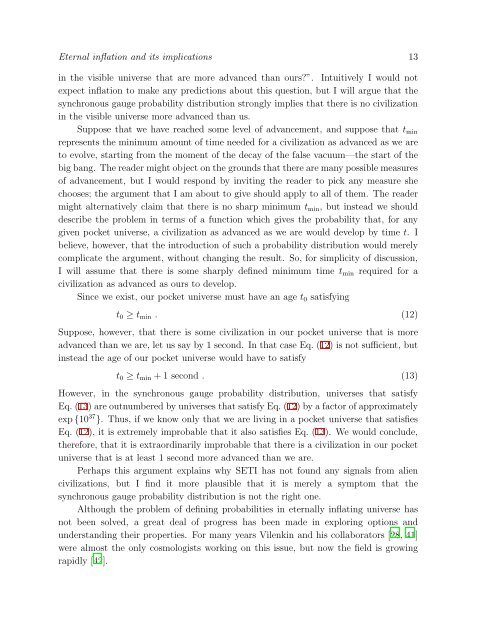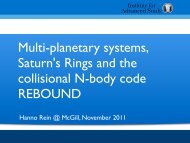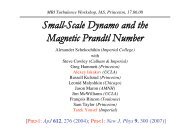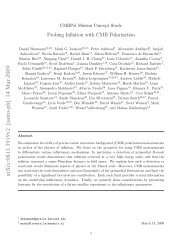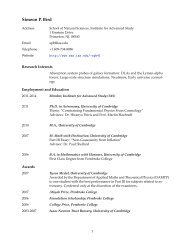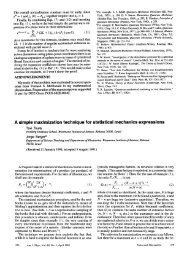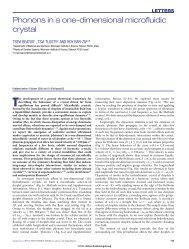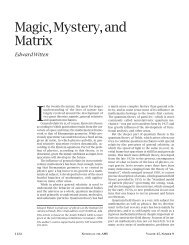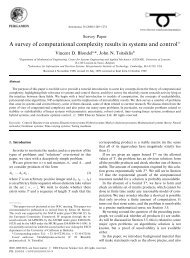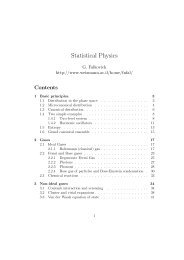Eternal inflation and its implications
Eternal inflation and its implications
Eternal inflation and its implications
Create successful ePaper yourself
Turn your PDF publications into a flip-book with our unique Google optimized e-Paper software.
<strong>Eternal</strong> <strong>inflation</strong> <strong>and</strong> <strong>its</strong> <strong>implications</strong> 13<br />
in the visible universe that are more advanced than ours?”. Intuitively I would not<br />
expect <strong>inflation</strong> to make any predictions about this question, but I will argue that the<br />
synchronous gauge probability distribution strongly implies that there is no civilization<br />
in the visible universe more advanced than us.<br />
Suppose that we have reached some level of advancement, <strong>and</strong> suppose that t min<br />
represents the minimum amount of time needed for a civilization as advanced as we are<br />
to evolve, starting from the moment of the decay of the false vacuum—the start of the<br />
big bang. The reader might object on the grounds that there are many possible measures<br />
of advancement, but I would respond by inviting the reader to pick any measure she<br />
chooses; the argument that I am about to give should apply to all of them. The reader<br />
might alternatively claim that there is no sharp minimum t min , but instead we should<br />
describe the problem in terms of a function which gives the probability that, for any<br />
given pocket universe, a civilization as advanced as we are would develop by time t. I<br />
believe, however, that the introduction of such a probability distribution would merely<br />
complicate the argument, without changing the result. So, for simplicity of discussion,<br />
I will assume that there is some sharply defined minimum time t min required for a<br />
civilization as advanced as ours to develop.<br />
Since we exist, our pocket universe must have an age t 0 satisfying<br />
t 0 ≥ t min . (12)<br />
Suppose, however, that there is some civilization in our pocket universe that is more<br />
advanced than we are, let us say by 1 second. In that case Eq. (12) is not sufficient, but<br />
instead the age of our pocket universe would have to satisfy<br />
t 0 ≥ t min + 1 second . (13)<br />
However, in the synchronous gauge probability distribution, universes that satisfy<br />
Eq. (13) are outnumbered by universes that satisfy Eq. (12) by a factor of approximately<br />
exp {10 37 }. Thus, if we know only that we are living in a pocket universe that satisfies<br />
Eq. (12), it is extremely improbable that it also satisfies Eq. (13). We would conclude,<br />
therefore, that it is extraordinarily improbable that there is a civilization in our pocket<br />
universe that is at least 1 second more advanced than we are.<br />
Perhaps this argument explains why SETI has not found any signals from alien<br />
civilizations, but I find it more plausible that it is merely a symptom that the<br />
synchronous gauge probability distribution is not the right one.<br />
Although the problem of defining probabilities in eternally inflating universe has<br />
not been solved, a great deal of progress has been made in exploring options <strong>and</strong><br />
underst<strong>and</strong>ing their properties. For many years Vilenkin <strong>and</strong> his collaborators [28, 41]<br />
were almost the only cosmologists working on this issue, but now the field is growing<br />
rapidly [42].


